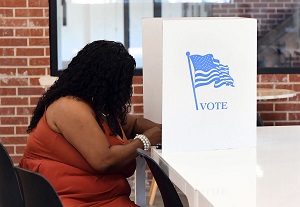Mississippi News
Powerful writing on racism could inspire SCOTUS to hear Mississippi case
This judge’s powerful writing on racism could inspire U.S. Supreme Court to hear Mississippi case
Editor’s note: This story contains graphic language. Also, you can read Judge James Graves’ complete dissent at the bottom of this story.
A dissent written by U.S. Court of Appeals Judge James Graves Jr. could play a key role in determining whether the U.S. Supreme Court will hear an appeal of a case that has, so far, upheld Mississippi’s Jim Crow-era constitutional provision written to keep Black people from voting.
Last month, the 5th U.S. Court of Appeals upheld a Mississippi constitutional provision that bans people convicted of certain felonies from voting. White leaders in Mississippi included most of those specific felonies in the state’s 1890 Constitution because they thought those crimes were more likely to be committed by African Americans.
Though attorneys challenging the provision in court say it has continued to disenfranchise Black Mississippians, a majority of the 5th Circuit Court of Appeals did not agree. Following the appeals court’s ruling, plaintiff attorneys said they plan to appeal the lower court’s ruling to the U.S. Supreme Court. They have 90 days from the final verdict that was issued on Aug. 24 the file the appeal.
Graves, a Black man from Mississippi who was appointed to the federal appeals court in 2010, wrote a 47-page dissent that outlines the state’s long and disturbing history of racism and its impact on America.
Rob McDuff, an attorney with the Mississippi Center for Justice who is working on the case, said Graves’ dissent could increase the odds the Supreme Court will take up the case.
“A strong dissent like that of Justice Graves’ can highlight for the Supreme Court that this is an important case where the Court of Appeals is sharply divided,” said McDuff, who has argued four cases before the nation’s highest court. “This increases the chances the Supreme Court will take the case although it’s no guarantee.”
READ MORE: 5th Circuit upholds Jim Crow-era law written to keep Black Mississippians from voting
A majority of the 17 members of the Court of Appeals that heard the case acknowledged that the felony suffrage provision, like many in the 1890 Constitution, was intended to prevent African Americans, then a majority in the state, from voting. That reality would be difficult to deny.
“The plan is to invest permanently the powers of government in the hands of the people who ought to have them: the white people,” James Zachariah George, a U.S. senator who was one of the architects of the 1890 Constitution and to this day has a statue in the U.S. Capitol representing Mississippi, said at the time.
But the nine members of the court who made up the majority in the recent ruling said that when state lawmakers added murder and rape as disenfranchising crimes in 1968, “the racial taint” was removed because the original 1890 language crafted by George and others had been amended.
“The critical issue here is not the intent behind Mississippi’s 1890 Constitution, but whether the reenactment of Section 241 (the felony disenfranchisement language) in 1968 was free of intentional racial discrimination,” the nine-member majority wrote.
The majority concluded it was.
“Mississippi (represented by the office of Attorney General Lynn Fitch) has conclusively shown that any taint associated with Section 241 has been cured,” the majority wrote last month in an unsigned opinion.
But in his blistering dissent, Graves methodically wrote that the racial taint had not at all been removed by state lawmakers in the 1960s.
He pointed out that the Legislature did not reenact Section 241 in 1968; it simply passed a provision to include murder and rape as disenfranchising crimes. Section 241 would have remained in effect regardless of whether the amendment adding murder and rape was approved by voters.
And perhaps more importantly, Graves pointed out many of the people in the Legislature and indeed the electorate as a whole at that time had been engaged in preventing Black Mississippians from voting and from integrating schools and society. Many of those same people had been engaged in violence against African Americans.
Graves cited Tom Brady, a member of the Mississippi Supreme Court in 1968. Graves pointed out Brady wrote in a book that was available in many Mississippi schools: “You can dress a chimpanzee, housebreak him, and teach him to use a knife and fork, but it will take countless generations of evolutionary development, if ever, before you can convince him that a caterpillar or cockroach is not a delicacy. Likewise the social, economic and religious preferences of the Negro remain close to the caterpillar and the cockroach.”
Graves, in his dissent, also pointed out that in the mid 20the Century while Mississippi lawmakers were removing a racial taint from its state Constitution, according to the majority ruling, white South African leaders were traveling to Mississippi “to learn how best to keep their own Black population disempowered and impoverished in perpetuity,” and earlier Nazi leader Adolph Hitler proclaimed the goal of making a conquered region “our Mississippi.”
Graves cited a passage from a 1960s newspaper article detailing efforts during school desegregation when Mississippians were, according to the Court’s majority opinion, removing the racial taint from the felony suffrage provision of the 1890 Constitution.
“Some husky young men were whipping a little Negro girl with pigtails,” the reporter wrote. “She was running. The men chased after her, whooping and leaping up and down like animals.”
The dissent was filled with such reports of violence and of loss of life for African Americans.
Graves, a Clinton native, was one of the first African American circuit judges in the state – appointed to the post in 1991 by then-Gov. Ray Mabus. In 2001, he was appointed to the state Supreme Court by then-Gov. Ronnie Musgrove. President Barack Obama appointed him to a slot on the federal Court of Appeals in 2010.
Graves, in his dissent, recalled his own upbringing and life in Mississippi.
“Recounting Mississippi’s history forces me to relive my experiences growing up in the Jim Crow era,” he wrote. “While I do not rely on those experiences in deciding this case, I would be less than candid if I did not admit that I recall them. Vividly.
“So I confess that I remember in 1963 a cross that was burned on my grandmother’s lawn two doors down from where I grew up,” he wrote.
Graves goes on to recount his experiences with school desegregation, and his disdain after being appointed to the judiciary of having to serve under the state flag that contained the Confederate battle emblem as part of its design.
Graves also highlights actions in 2020 by the Legislature to replace the flag. But after that historic achievement, he pointed out Mississippi to this day is the only state to recognize a Confederate Heritage Month, and while other states recognize Martin Luther King Jr. Day, Mississippi honors Confederate General Robert E. Lee on the same day.
“I recount these events, as a native Mississippian, only to highlight the importance of making the right decision in this case,” Graves wrote.
Read Judge Graves’ complete dissent below. His dissent begins on page 36.
This article first appeared on Mississippi Today and is republished here under a Creative Commons license.
Mississippi News
Ole Miss women get pair of double-doubles and roll to 83-65 March Madness win over Ball State
SUMMARY: Mississippi coach Yolett McPhee-McCuin found solace in returning to a different arena in Waco, Texas, following a disappointing previous tournament experience. The No. 5 seed Ole Miss Rebels redeemed themselves with an 83-65 victory over 12th-seeded Ball State in the NCAA Tournament’s first round. Starr Jacobs led the Rebels with 18 points and 11 rebounds, while Kennedy Todd-Williams and Madison Scott each scored 15 points. Ole Miss dominated rebounding, leading 52-32, and will face fourth-seeded Baylor next. Coach McPhee-McCuin noted the team’s evolution since their last visit and the significance of playing in Texas, where Jacobs feels at home.
The post Ole Miss women get pair of double-doubles and roll to 83-65 March Madness win over Ball State appeared first on www.wjtv.com
Mississippi News
Events happening this weekend in Mississippi: March 21-23
SUMMARY: This weekend (March 21-23), Mississippi offers a range of exciting events. Highlights include Hal’s Marching MALfunction Second Line Stomp and Jessie Robinson’s blues performance in Jackson, as well as the Natchez Food & Wine Festival and the Natchez Little Theatre’s production of *This Side of Crazy*. There are also numerous exhibitions like *Of Salt and Spirit: Black Quilters in the American South* in Jackson and *Gold in the Hills* in Vicksburg. Other events include the 48th Annual Crawfish Classic Tennis Tournament in Hattiesburg, karaoke nights in Laurel, and a variety of family-friendly activities across the state.
The post Events happening this weekend in Mississippi: March 21-23 appeared first on www.wjtv.com
Mississippi News
Events happening this weekend in Mississippi: March 14-16
SUMMARY: This weekend (March 14-16) in Mississippi offers a variety of events. In Jackson, iconic saxophonist Boney James performs at the convention center, while the JXN Food & Wine festival showcases culinary talents. The LeFleur Museum District hosts a “Week of Wonder,” and several exhibitions, including “Of Salt and Spirit,” celebrate Black quilters. Natchez features the Spring Pilgrimage tours, a reenactment of Annie Stewart’s story, and a St. Patrick’s Day celebration. In Hattiesburg, comedian Rob Schneider performs, and various events like a St. Patrick’s Day pub crawl and a talent show will take place throughout the area.
The post Events happening this weekend in Mississippi: March 14-16 appeared first on www.wjtv.com
-

 News from the South - Florida News Feed7 days ago
News from the South - Florida News Feed7 days agoFamily mourns death of 10-year-old Xavier Williams
-

 News from the South - Alabama News Feed5 days ago
News from the South - Alabama News Feed5 days agoSevere storms will impact Alabama this weekend. Damaging winds, hail, and a tornado threat are al…
-

 News from the South - Alabama News Feed5 days ago
News from the South - Alabama News Feed5 days agoUniversity of Alabama student detained by ICE moved to Louisiana
-

 News from the South - Louisiana News Feed6 days ago
News from the South - Louisiana News Feed6 days agoSeafood testers find Shreveport restaurants deceiving customers with foreign shrimp
-

 News from the South - Oklahoma News Feed7 days ago
News from the South - Oklahoma News Feed7 days agoWhy are Oklahomans smelling smoke Wednesday morning?
-

 News from the South - Oklahoma News Feed3 days ago
News from the South - Oklahoma News Feed3 days agoTornado watch, severe thunderstorm warnings issued for Oklahoma
-

 News from the South - West Virginia News Feed6 days ago
News from the South - West Virginia News Feed6 days agoRoane County Schools installing security film on windows to protect students
-

 News from the South - West Virginia News Feed7 days ago
News from the South - West Virginia News Feed7 days agoStudents in Monroe County Schools are ready to shoot their way to the WV State Archery Championships














































